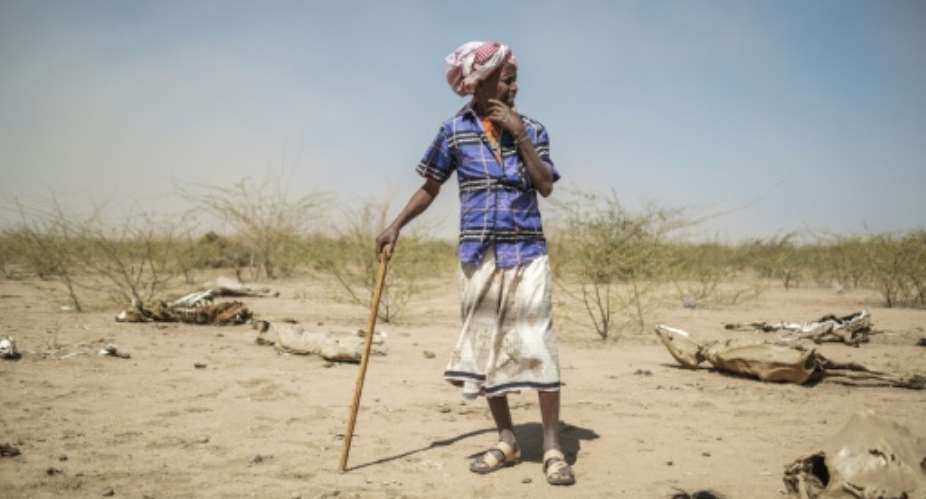The UN appealed Tuesday for pledges to address the "critical" humanitarian situation in Ethiopia, where more than 21 million people need aid and a dire food crisis is deepening.
A donor conference at the United Nations' European headquarters Tuesday afternoon aims to raise significant pledges towards the $1 billion urgently needed to cover aid for just the next three months.
"We need to mobilise," Ramiz Alakbarov, the UN humanitarian coordinator in Ethiopia, told AFP ahead of the conference.
"The people of Ethiopia need our solidarity and our support."
Ethiopians are facing rumbling internal conflicts amid economic and climate shocks and an increasingly dire food and malnutrition crisis.
The UN has said $3.24 billion is needed this year alone, including to assist some four million internally displaced people.
But so far, that plan is less than five percent funded.
"The gap remains very wide... We have really to act before it is too late," Shiferaw Teklemariam, commissioner of the Ethiopian Disaster Risk Management Commission, told reporters in Geneva.
The Ethiopian government has committed $250 million for food support over coming months, the commissioner added.
The UN said an initial $1 billion was needed for the urgent aid response through the end of June.
It is also needed to prepare for the lean season, from July to September, when around 11 million people are projected to be critically food insecure.
'Very fragile'
"The humanitarian situation in Ethiopia is critical -- but there is a window to act right now to break the downward spiral," UN humanitarian agency, OCHA, said.
The event, co-hosted by the governments of Ethiopia and Britain, comes a day after a similar pledging conference for Sudan, held in Paris, raised $2.1 billion.
Britain's deputy foreign minister Andrew Mitchell said the situation was "extremely worrying".
He spoke of "increasingly worrying famine conditions", but stressed "the international community working very closely with the government of Ethiopia was in a position to head it off".
Britain, he said, would pitch in £100 million ($125 million) in additional funding, bringing its total for the year to £198 million, "our biggest programme anywhere in the world".
During Tuesday's event, the United States -- Ethiopia's largest humanitarian aid donor -- said it would provide $154 million in additional assistance, bringing its aid support to the country this fiscal year to $243 million.
"We have millions and millions of people in Ethiopia facing very severe food insecurity," USAID Deputy Administrator Isobel Coleman told AFP ahead of the conference, warning that "the humanitarian situation in the country remains very, very fragile".
Without more aid, "the consequences could be very dire", she said.
'Not enough aid to distribute'
But she stressed that strong measures would be needed to ensure the aid reaches its intended destination.
Last year, USAID and the UN's World Food Programme temporarily halted all food aid to Ethiopia, alleging a "widespread and coordinated" campaign to divert donated supplies -- something Ethiopia's government denied.
Coleman described the decision to pause the food aid as "truly wrenching".
Ramiz stressed that distribution had since resumed, following stringent reforms and the introduction of "one of the most detailed, and the most verified processes I have ever observed in my life".
He voiced confidence the system was working and all aid would reach its intended destination. "The problem is that we don't have enough to distribute."
Authorities in the war-ravaged northern Tigray region warned last December it was on the brink of famine.
"So much of this food insecurity is being driven by conflict," Coleman said.
"Until we have peace and security in the country, which allows full access for humanitarian players. We're really not going to be able to get a full handle on this humanitarian crisis."





 Akufo-Addo’s recent attitude, utterances connote an arrogant nature, smack of an...
Akufo-Addo’s recent attitude, utterances connote an arrogant nature, smack of an...
 NDC calls for immediate termination of contracts between SML and GRA
NDC calls for immediate termination of contracts between SML and GRA
 NDC demands retrieval of monies paid to SML, calls for the prosecution of person...
NDC demands retrieval of monies paid to SML, calls for the prosecution of person...
 NDC accuses President Akufo-Addo of attempting to cover up corruption and crimin...
NDC accuses President Akufo-Addo of attempting to cover up corruption and crimin...
 Election 2024: ‘I don't want issues of independent candidature to plague NPP’ — ...
Election 2024: ‘I don't want issues of independent candidature to plague NPP’ — ...
 2024 elections: Bawumia avoiding economic discourse because he has failed — Kwak...
2024 elections: Bawumia avoiding economic discourse because he has failed — Kwak...
 Mustapha Ussif’s ‘Best African Sports Minister’ award signifies his exceptional ...
Mustapha Ussif’s ‘Best African Sports Minister’ award signifies his exceptional ...
 Anti-LGBQI+ Bill: High Court’s verdict was predetermined – Sam George
Anti-LGBQI+ Bill: High Court’s verdict was predetermined – Sam George
 Justification for continuation of SML-GRA contract ‘hogwash’ – Sammy Gyamfi
Justification for continuation of SML-GRA contract ‘hogwash’ – Sammy Gyamfi
 Bawumia is a liar, google it and see – Osofo Kyiri Abosom
Bawumia is a liar, google it and see – Osofo Kyiri Abosom
